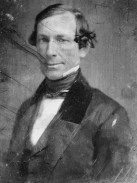Living
America’s first gay vice president?
‘Lifelong bachelor’ William Rufus King lived with President Buchanan

Editor’s note: This is the first installment in a month-long series profiling prominent figures in American history who were gay (or rumored to be) as part of the National Gay History Project commemorating LGBT History Month. For more coverage, visit washingtonblade.com.
William Rufus DeVane King, the 13th United States vice president, has the distinction of having served in that office for less time than any other vice president.
He died of tuberculosis on April 18, 1853, just 25 days after being sworn into office on March 24, 1853, according an official biography of King prepared by the Office of the Historian of the U.S. Senate.
Other historians have speculated that King holds yet another distinction — the likely status of being the first gay U.S. vice president and possibly one of the first gay members of the U.S. House of Representatives and the U.S. Senate.

William Rufus DeVane King, the 13th United States vice president, is believed by some historians to have been gay. He holds the distinction of being sworn into office on foreign soil, while in Cuba for health reasons.
King (1786-1853) served in the House of Representatives from North Carolina for six years beginning in 1811 and later served in the Senate from the newly created state of Alabama from 1819-44, when he became U.S. minister to France.
He returned to the Senate four years later, in 1848, where he served until December 1852, when he resigned after winning election in November 1852 as vice president on the ticket of Franklin Pierce.
A lifelong bachelor, King lived for 15 years in the home of future U.S. president James Buchanan while the two served in the Senate. Buchanan, also a lifelong bachelor, is believed by some historians to be the nation’s first gay president.
“They certainly didn’t have the word gay back then,” said Paul F. Boller Jr., professor emeritus of history at Texas Christian University and author of several books on presidential politics, including the book “Presidential Campaigns: From George Washington to George W. Bush.”
In a telephone interview, Boller said Washington insiders at the time speculated over whether King and Buchanan’s well-known close friendship had evolved into a romantic relationship.
“I don’t think the word homosexual was used either,” Boller said. “So they’d sort of use the term ‘a little feminine’ and all of that.”
Boller and historian Jean H. Baker, professor of history at Maryland’s Goucher College and author of a biography of Buchanan, each cite reports that President Andrew Jackson referred to King as “Miss Nancy” and “Aunt Fancy.” Aaron V. Brown, who became U.S. postmaster general while Buchanan was president, reportedly referred to King as Buchanan’s “wife.”
Baker reports in her Buchanan biography that King’s and Buchanan’s nieces reportedly destroyed their uncles’ correspondence with each other, fueling speculation that the two men were in a gay relationship that their families wanted to conceal.
In one letter that survived, Buchanan expressed sadness over King’s departure from his house in 1844 to become the U.S. envoy to France.
“I am now solitary and alone, having no companion in the house with me,” Buchanan wrote. “I have gone a wooing to several gentlemen, but have not succeeded with any one of them.”
King’s relationship with Buchanan, who was from Pennsylvania, could have been a factor in Buchanan’s sympathy for the South during Buchanan’s tenure as a senator and later as president from 1857-61.
Most accounts by historians of King’s political career portray him as a moderate southerner who supported slavery while emerging as a strong unionist. King voiced opposition in the Senate to calls by some of his fellow southerners for the South to secede from the United States during the tense decade prior to the Civil War.
“From such a calamity may God in His mercy deliver us,” King wrote in expressing opposition to the growing calls for secession.
King was born in 1786 in Sampson County, N.C., to a family of wealthy planters. His father owned more than two-dozen slaves, the Office of the Senate Historian reports in its biography of King.
It says King attended an elite preparatory school before attending the University of North Carolina, where he studied law. Following a legal apprenticeship, he was admitted to the state bar in 1805 and began a legal practice. He served in the North Carolina Legislature from 1808-09 and won election in 1810 to the U.S. House and began serving as a congressman in 1811 at age 25.
He resigned from the House in 1816 to enter the world of diplomacy by taking a job as legation secretary for William Pinkney, who was appointed by President James Monroe as U.S. minister to Russia in St. Petersburg. King returned to the U.S. in 1818, when he moved from North Carolina to the territory of Alabama, becoming one of the leaders of the Alabama statehood movement.
The Senate historian’s biography says King purchased 750 acres of land in Alabama and established a plantation. He later joined others to form a land company that founded the town of Selma, which King reportedly named. In December 1819, he became one of Alabama’s first two U.S. senators.
As a moderate Democrat, King became an early supporter of Andrew Jackson’s quest to become president, the Senate biography says. It quotes an unnamed critic of King as describing him as a “tall, prim, wig-topped mediocrity,” noting that King wore a wig “long after such coverings had gone out of fashion.”
The biography quotes a fellow senator as having this to say about King: “He was distinguished by the scrupulous correctness of his conduct. He was remarkable for his quiet and unobtrusive, but active practical usefulness as a legislator … To his honor be it spoken, he never vexed the ear of the Senate with ill-timed, tedious or unnecessary debate.”
The Encyclopedia of Alabama reports in a 2003 article that rumors circulating in Washington about King’s sexual orientation increased as his close friendship with Buchanan became widely known.
“Neither man ever married, and by 1836 they were sharing a residence in Washington,” the encyclopedia article says. “Any negative reactions to their relationship appear to have had little effect, and the men continued with their living arrangement and their work as legislators.”
By 1840, newspapers in Alabama supportive of the Democratic Party, of which King was a prominent member, promoted King as a vice-presidential running mate for incumbent President Martin Van Buren. Although King received little support outside Alabama for the vice-presidential nomination, he continued to position himself behind the scenes as a possible vice-presidential candidate for the next two decades, the Alabama Encyclopedia reports.
The Senate biography of King says President John Tyler interrupted King’s vice-presidential ambitions in 1844 when he nominated him to become U.S. minister to France and the Senate quickly confirmed the nomination by a lopsided margin.
The bio says King succeeded in his main mission to persuade France not to oppose U.S. plans to annex Texas, which the U.S. acquired following the Mexican-American War.
King returned to the Senate in 1848, two years after completing his service in France. In July 1850, King became the de facto U.S. vice president when President Zachary Taylor died in office and then-Vice President Millard Filmore became president, leaving the office of vice president vacant.
King’s Senate colleagues responded by unanimously selecting him as president pro tempore of the Senate, which normally would have placed him third in line to become president. With the vice president’s post vacant, King emerged as first in line to become president if Filmore were to die in office.
In 1852, after years of vying for the vice-presidential nomination, the constellations appeared to be in perfect alignment with Democratic Party politics for King’s longtime dream. After nominating Franklin Pierce for president on the 49th ballot, the Democratic Convention, convening in Baltimore, nominated King as Pierce’s running mate. In the ensuing months, King campaigned aggressively for the Pierce-King ticket, playing some role in Pierce’s victory in November 1852.
But biographers report that King’s coughing spells became increasingly frequent and painful, leading to a diagnosis of tuberculosis. By December 1852, King described himself to friends as “looking like a skeleton,” the Senate biography reports. Later that month he resigned from the Senate and made arrangements, at the advice of his doctor, to spend the winter in Cuba, where the warm, tropical climate would perhaps help him regain his health.
In early February 1853, King realized his condition was getting worse and he would not be well enough to travel to Washington in time for the March 4 inauguration ceremony.
Upon learning of King’s deteriorating health, Congress took the unusual step of passing a law allowing him to take the oath of office for vice president on foreign soil.
“On March 24, 1853, near Matanzas, a seaport town 60 miles from Havana, the gravely ill statesman, too feeble to stand unaided, became the nation’s 13th vice president,” his Senate biography says.
King boarded a ship to return to the U.S. in April 1853 and arrived home at his Alabama plantation on April 17. He died one day later at age 67.
David Durham, a University of Alabama professor of law and history, said in a Sept. 9 interview that it remains an open question whether King was gay. Durham said it’s also uncertain but a strong possibility that King played a role in shaping Buchanan’s policies and views on the issue of slavery in the years leading up to the Civil War.
“I don’t think anybody can prove it one way or the other,” he said in discussing King’s sexual orientation.
“A lot of the speculation comes from misinterpreting, I think, 19th century lifestyles, where men commonly slept in the same bed and thought nothing of it,” Durham said. “And the kind of terms of affection used in letters and correspondence between males — in our society now it’s like, umm, that’s very interesting. But they thought nothing of it and it didn’t mean there was some kind of romantic attachment,” he said.
“But that’s not to say that there wasn’t,” Durham added.

Dear Michael,
I keep getting rejected on the apps. I don’t want to put myself out there anymore.
I don’t understand gay men. I think they behave really badly.
Guys stop replying in the middle of a text conversation and then un-match me. Guys don’t show up when we make a plan to meet. After a date or even a hookup that it seems clear we both enjoyed, I never hear from the guy again.
I am a pretty good looking and successful guy. I’m not a model or a billionaire but I’m sincerely wanting to date and eventually share a life with someone.
Unfortunately, everyone I am meeting, even if they say they have similar aspirations for a partner, acts like they’re looking over my shoulder for something better, and drops me for I-don’t-know-what reason.
I don’t have a lot of trust in the sincerity of gay men.
I know I sound bitter but I’ve been at this for a while and it keeps happening.
I know there’s a saying that if it keeps happening to you, you must be the problem. Logically that makes sense.
Except, I think this keeps happening so often and so predictably that it’s not me. These people hardly know me. It’s more along the lines of, if everything about me isn’t exactly what they want, or some little thing that I say, think, or do offends them, they vanish.
I’m lonely, but what’s out there is awful. Maybe it’s best to not keep trying.
If you have a different way of seeing it that’s honest, not just some fluff to make me feel better and be hopeful, please enlighten me.
Michael replies:
I agree with you, there is a lot of this kind of behavior out there. I hear stories similar to yours all the time. Though people do find great relationships online, relying on apps to meet a partner can be tricky.
Hookup apps have little to do with any kind of real connection. Often, they don’t even have much to do with sex. For a lot of people, they’re more about trying to fill up some kind of emptiness and seeking validation. They also, obviously, objectify men, which is the opposite experience of what you’re seeking.
And dating apps lend themselves to a sort of takeout menu concept of dating. You get to specify exactly what you’re looking for—a little of this, a lot of that, please omit something else—and then believe you should get what you ordered. As if that really exists. And when something isn’t just what you wanted, forget it.
But life doesn’t work that way. Nor do people: You can enter the exact criteria for the man of your dreams, but he will surprise you or let you down at times in some major ways. That’s how it goes. Part of being in a relationship is accepting that we all have to deal with imperfection.
All that said, hordes of people are going to keep using all sorts of apps and keep looking for “perfect” partners and keep ditching perfectly fine guys for the most minuscule of reasons.
But that doesn’t mean that you have to stay on the apps if it’s demoralizing you and leaving you hopeless.
Before you sign off, perhaps you would like to have some fun and be creative. Just for example, you could write in your profile that you’re interested in meeting a guy who isn’t looking for perfection and is looking for a decent soul rather than a set of stats. You still might encounter a lot of guys who ghost you for no apparent reason, but you also might have some luck finding a sincere someone with relationship goals that are similar to yours.
Another, complimentary strategy: Toughen up your attitude to stop letting let these rejections get under your skin. They have little to do with who you are (unless you are oblivious to some major issue about yourself), so you needn’t take them personally. In other words, expect this to keep happening; and when it does, laugh and keep moving forward.
I understand you are feeling like giving up on gay men in general. Keep in mind that while there are a lot of reasons why many gay men focus more on sex and less on commitment, that isn’t true across the board. In my work over the years, I have met many gay men who are looking for what you’re seeking. You could strive to be hopeful that if you keep looking, you are likely to cross paths with some of them.
And where you look may play a role.
Whether or not you stay on the apps, I suggest you seek additional ways to meet a potential boyfriend. Before apps existed, people did find other ways to meet romantic partners, and these ways do still exist. I know that this path is not an easy one. The whole dating endeavor isn’t easy. But difficult is not impossible.
There are social and activity groups for gay men that are organized around some sort of shared interest. They aren’t overtly sexual, so often attract people who are interested in and looking for a deeper connection. Even if you don’t meet a boyfriend there, you might make some like-minded friends, and one thing may lead to another in all sorts of ways.
There’s also plenty you can do as a human being (not simply as a gay man) in the offline world that might interest and even uplift you, where you just might meet a man you like. Again, you might also simply make some friends, and through having a bigger social life, might ultimately meet your guy.
Simply put: Don’t let yourself feel like or be a victim. Don’t keep putting yourself in miserable situations. And figure out what it means for you to do your best to make what you’d like to happen, happen.
Michael Radkowsky, Psy.D. is a licensed psychologist who works with couples and individuals in D.C., Maryland, Virginia, and New York. He can be found at michaelradkowsky.com. All identifying information has been changed for reasons of confidentiality. Have a question? Send it to [email protected].
Real Estate
New year, new housing landscape for D.C. landlords
Several developments expected to influence how rental housing operates

As 2026 begins, Washington, D.C.’s rental housing landscape continues to evolve in ways that matter to small landlords, tenants, and the communities they serve. At the center of many of these conversations is the Small Multifamily & Rental Owners Association (SMOA), a D.C.–based organization that advocates for small property owners and the preservation of the city’s naturally occurring affordable housing.
At their December “DC Housing Policy Summit,” city officials, housing researchers, lenders, attorneys, and housing providers gathered to discuss the policies and proposals shaping the future of rental housing in the District. The topics ranged from recent legislative changes to emerging ballot initiatives and understanding how today’s policy decisions will affect housing stability tomorrow.
Why Housing Policy Matters in 2026
If you are a landlord or a tenant, several developments now underway in D.C., are expected to influence how rental housing operates in the years ahead.
One of the most significant developments is the Rebalancing Expectations for Neighbors, Tenants and Landlords (RENTAL) Act of 2025, a sweeping piece of legislation passed last fall and effective December 31, 2025, which updates a range of housing laws. This broad housing reform law will modernize housing regulations and address long-standing court backlogs, and in a practical manner, assist landlords with shortened notice and filing requirements for lawsuits. The Act introduces changes to eviction procedures, adjusts pre-filing notice timelines, and modifies certain tenant protections under previous legislation, the Tenant Opportunity to Purchase Act.
At the same time, the District has expanded its Rent Registry, to have a better overview of licensed rental units in the city with updated technology that tracks rental units subject to and exempt from rent control and other related housing information. Designed to improve transparency and enforcement, Rent Registry makes it easier for all parties to verify rent control status and compliance.
Looking ahead to the 2026 election cycle, a proposed ballot initiative for a two-year rent freeze is generating significant conversation. If it qualifies for the ballot and is approved by voters, the measure would pause rent increases across the District for two years. While still in the proposal phase, it reflects the broader focus on tenant affordability that continues to shape housing policy debates.
What This Means for Rental Owners
Taken together, these changes underscore how closely policy and day-to-day operations are connected for small landlords. Staying informed about notice requirements, registration obligations, and evolving regulations isn’t just a legal necessity. It’s a key part of maintaining stable, compliant rental properties.
With discussions underway about rent stabilization, voucher policies, and potential rent freezes, long-term revenue projections will be influenced by regulatory shifts just as much as market conditions alone. Financial and strategic planning becomes even more important to protect your interests.
Preparing for the Changes
As the owner of a property management company here in the District, I’ve spent much of the past year thinking about how these changes translate from legislation into real-world operations.
The first priority has been updating our eviction and compliance workflows to align with the RENTAL Act of 2025. That means revising how delinquent rent cases are handled, adjusting notice procedures, and helping owners understand how revised timelines and court processes may affect the cost, timing, and strategy behind enforcement decisions.
Just as important, we’re shifting toward earlier, more proactive communication around compliance and regulatory risk. Rather than reacting after policies take effect, we’re working to flag potential exposure in advance, so owners can make informed decisions before small issues become costly problems.
A Bigger Picture for 2026
Housing policy in Washington, D.C., has always reflected the city’s values from protecting tenants to preserving affordability in rapidly changing neighborhoods. As those policies continue to evolve, the challenge will be finding the right balance between stability for renters and sustainability for the small property owners who provide much of the city’s housing.
The conversations happening now at policy summits, in Council chambers, and across neighborhood communities will shape how rental housing is regulated. For landlords, tenants, and legislators alike, 2026 represents an opportunity to engage thoughtfully, to ask hard questions, and to create a future where compliance, fairness, and long-term stability go hand-in-hand.
Real Estate
Unconventional homes becoming more popular
HGTV show shines spotlight on alternatives to cookie cutter

While stuck in the house surrounded by snow and ice, I developed a new guilty pleasure: watching “Ugliest House in America” on HGTV. For several hours a day, I looked at other people’s unfortunate houses. Some were victims of multiple additions, some took on the worst décor of the ‘70s, and one was even built in the shape of a boat.
In today’s world, the idea of what a house should look like has shifted dramatically. Gone are the days of cookie-cutter suburban homes with white picket fences. Instead, a new wave of architects, designers, and homeowners are pushing the boundaries of traditional housing to create unconventional and innovative spaces that challenge our perceptions of what a home can be.
One of the most popular forms of alternative housing is the tiny house. These pint-sized dwellings are typically fewer than 500 square feet and often are set on trailers to allow for mobility. Vans and buses can also be reconfigured as tiny homes for the vagabonds among us.
These small wonders offer an affordable and sustainable living option for those wishing to downsize and minimize their environmental footprint. With clever storage solutions, multipurpose furniture, and innovative design features, tiny homes have become a creative and functional housing solution for many, although my dogs draw the line at climbing Jacob’s Ladder-type steps.
Another unusual type of housing gaining popularity is the shipping container home. Made from repurposed shipping containers, these homes offer a cost-effective and environmentally friendly way to create modern and sleek living spaces. With their industrial aesthetic and modular design, shipping container homes are a versatile option for those contemplating building a unique and often multi-level home.
For those looking to connect with nature, treehouses are a whimsical and eccentric housing option. Nestled high up in the trees, these homes offer a sense of seclusion and tranquility that is hard to find in traditional housing. With their distinctive architecture and stunning views, treehouses can be a magical retreat for those seeking a closer connection to the natural world.
For a truly off-the-grid living experience, consider an Earthship home. These self-sustaining homes use recycled construction materials and rely on renewable energy sources like solar power and rainwater harvesting. With their passive solar design and natural ventilation systems, Earthship homes are a model of environmentally friendly living.
For those with a taste for the bizarre, consider a converted silo home. These cylindrical structures provide an atypical canvas for architects and designers to create modern and minimalist living spaces. With curved walls and soaring ceilings, silo homes offer a one-of-a-kind living experience that is sure to leave an impression.
Barn homes have gained popularity in recent years. These dwellings take the rustic charm of a traditional barn and transform it into a modern and stylish living space. With their open, flexible floor plans, lofty ceilings, and exposed wooden beams, barn homes offer a blend of traditional and contemporary design elements that create a warm and inviting atmosphere, while being tailored to the needs and preferences of the homeowner.
In addition to their unique character, barn homes also offer a sense of history and charm that is hard to find in traditional housing. Many of them have a rich and storied past, with some dating back decades or even centuries.
If you relish life on the high seas (or at a marina on the bay), consider a floating home. These aquatic abodes differ from houseboats in that they remain on the dock rather than traverse the waterways. While most popular on the West Coast (remember “Sleepless in Seattle”?), you sometimes see them in Florida, with a few rentals available in Baltimore’s Inner Harbor and infrequent sales at our own D.C. Wharf. Along with the sense of community found in marinas, floating homes offer a peaceful retreat from the hustle and bustle of city life.
From tiny homes on wheels to treehouses in the sky or homes that float, these distinctive dwellings offer a fresh perspective on how we live and modify traditional thoughts on what a house should be. Sadly, most of these homes rely on appropriate zoning for building and placement, which can limit their use in urban or suburban areas.
Nonetheless, whether you’re looking for a sustainable and eco-friendly living option or a whimsical retreat, there is sure to be an unconventional housing option that speaks to your sense of adventure and creativity. So, why settle for a run-of-the-mill ranch or a typical townhouse when you can live in a unique and intriguing space that reflects your personality and lifestyle?
Valerie M. Blake is a licensed Associate Broker in D.C., Maryland, and Virginia with RLAH @properties. Call or text her at 202-246-8602, email her at [email protected] or follow her on Facebook at TheRealst8ofAffairs.
-

 Virginia3 days ago
Virginia3 days agoMcPike wins special election for Va. House of Delegates
-

 New York5 days ago
New York5 days agoPride flag removed from Stonewall Monument as Trump targets LGBTQ landmarks
-

 Florida5 days ago
Florida5 days agoDisney’s Gay Days ‘has not been canceled’ despite political challenges
-

 Philippines5 days ago
Philippines5 days agoPhilippines Supreme Court rules same-sex couples can co-own property



















